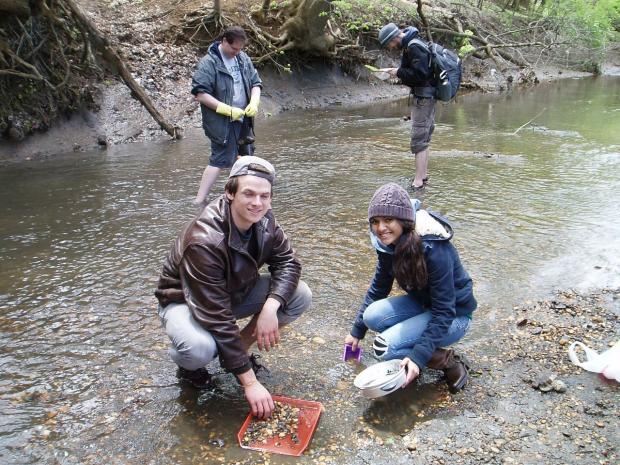- Academics
Sustainable Urban Environments, B.S.

Please Note: Applicants are no longer being accepted for this program.
Cities play a critical role in addressing the environmental challenges that face the world today. The Sustainable Urban Environments major prepares students to make cities more sustainable.
Students gain an understanding of the social and technical issues in urban environmental problems, and an appreciation of the policy and planning approaches that are necessary to create more livable, sustainable, and equitable cities. Multidisciplinary courses emphasize project-based learning, using New York City as an urban laboratory, and also examining sustainable cities in a global context.
Directed studies and capstone projects provide students with essential experience in conducting and presenting research at public forums within the School of Engineering. By the program’s end, our graduates are prepared to enter various environmental fields, including urban planning and design. They also partake in opportunities in social work, government, education, and museums.
Our students may choose to complete a 4+1 BS in SUE at Tandon/ Master's of Urban Planning (MUP) at Wagner and BS SUE at Tandon/MS in Applied Urban Science and Informatics at CUSP. Interested students should discuss these opportunities with their academic advisors prior to their junior year.
Curriculum
Sustainable Urban Environments Requirements
Core (33 credits)
- CE-UY 1002 Please refer to the bulletin for more information
- URB-UY 2004 Please refer to the bulletin for more information
- HI-UY 3034W Please refer to the bulletin for more information
- URB-UY 2024W Please refer to the bulletin for more information
- URB-UY 2044 Please refer to the bulletin for more information
- URB-UY 2054W Please refer to the bulletin for more information
- URB-UY 4034 Please refer to the bulletin for more information
- URB-UY 4012 Please refer to the bulletin for more information
- URB-UY 4022 Please refer to the bulletin for more information
And one of the following Civil Engineering courses:
- CE-UY 3303 Please refer to the bulletin for more information
- CE-UY 3313 Please refer to the bulletin for more information
- CE-UY 4033 Please refer to the bulletin for more information
- CE-UY 3363 Please refer to the bulletin for more information
- CE-UY 4043 Please refer to the bulletin for more information
Tracks/SUE Electives (16 credits)
Select at least 1 course from each group
History Group
- CE-UY 3353 Please refer to the bulletin for more information
- HI-UY 2514W Please refer to the bulletin for more information
- HI-UY 2724 Please refer to the bulletin for more information
- HI-UY 4334W Please refer to the bulletin for more information
Social Science Group
- PS-UY 2724 Please refer to the bulletin for more information
- PS-UY 2324W Please refer to the bulletin for more information
- PS-UY 3724 Please refer to the bulletin for more information
- PS-UY 3754 Please refer to the bulletin for more information
- URB-UY 2114 Please refer to the bulletin for more information
- URB-UY 2034 Please refer to the bulletin for more information
- URB-UY 3354 Please refer to the bulletin for more information
Environmental Group
- URB-UY 2184W Please refer to the bulletin for more information
- URB-UY 2194W Please refer to the bulletin for more information
- URB-UY 2064 Please refer to the bulletin for more information
- URB-UY 2224 Please refer to the bulletin for more information
- URB-UY 2234 Please refer to the bulletin for more information
- URB-UY 3034 Please refer to the bulletin for more information
- URB-UY 3214 Please refer to the bulletin for more information
- URB-UY 3234 Please refer to the bulletin for more information
- URB-UY 3314 Please refer to the bulletin for more information
Other
- URB-UY 3834 Please refer to the bulletin for more information
- URB-UY 401X Please refer to the bulletin for more information
General Education Requirements
Humanities and Social Sciences General Education Requirements (24 Credits)
- EXPOS-UA 1 Please refer to the bulletin for more information
- EXPOS-UA 2 Please refer to the bulletin for more information
4 Humanities and Social Sciences courses, including at least one course of Level 3 and one Writing Intensive course
General Requirements (20 credits)
- EG-UY 1001 Please refer to the bulletin for more information
- EG-UY 1003 Please refer to the bulletin for more information
General Technical Elective 4 Credits
Statistics- Choose one of the following:
OR
OR
ECON-UA 18 Statistics 4 Credits
OR
CORE-UA 105 Quant Reasoning: Elementary Statistics 4 Credits
OR
PSYCH-UA 10 Statistics for the Behavioral Sciences 4 Credits
OR
SOC-UA 302 Statistics for Social Research 4 Credits
8 credits of General Science Electives:
General Science Elective 4 Credits
Electives Requirements
Technical Electives (7 credits)
The technical electives requirement can be fulfilled by any course that advances the student’s knowledge of, or skills in applied science, engineering, or computer science. Students may choose 3 or 4 credit courses.
*Technical elective overload may be applied to free credits.
Free Electives (20 credits)
Choose 5 courses of free electives from any department.
Minor in Sustainable Urban Environments
This minor is open to all majors and is composed of 16 credits:
Two of the core courses in SUE:
- HI-UY 3034W Please refer to the bulletin for more information
- URB-UY 2024W Please refer to the bulletin for more information
- URB-UY 2044 Please refer to the bulletin for more information
- URB-UY 2054W Please refer to the bulletin for more information
- URB-UY 2004 Please refer to the bulletin for more information
8 credits satisfied by courses chosen from the SEG electives list
Internships
Examples of Internship sites for SUE students
As a SUE student, you are required to complete an internship course that allows you to complete an internship for course credit. This is a great way to gain experience in fields of your interest, while earning credits toward graduation.
Students in our SUE program have interned at places like:
- Center for Medicare Advocacy (Washington DC)
- New York City Department of City Planning, GIS Team
- Housing Network of Rhode Island
- Shanghai World Expo 2010
- Solar I
- New York City Department of Mental Health & Hygiene-Built Environment Division
- Maplewood, NJ-Engineering Department
- Greenwich Village Society for Historic Preservation
- Recycle-a-Bicycle
- New York City Department of City Planning
- Big Duck NYC
- New York City Metropolitan Transportation Authority
Sample Course Schedule
SUE students can arrange their schedules in accordance with their sustainability interests in consultation with the academic advisor. The sample schedule below is one way to fulfill the requirements, and it incorporates a study away in the junior year at one of New York University's global university campuses.
First Year
Fall Semester
- EG-UY 1001 Please refer to the bulletin for more information
- EG-UY 1003 Please refer to the bulletin for more information
- EXPOS-UA 1 Please refer to the bulletin for more information
SUE Track Course 4 Credits
Spring Semester
- CE-UY 1002 Please refer to the bulletin for more information
- EXPOS-UA 2 Please refer to the bulletin for more information
- URB-UY 2004 Please refer to the bulletin for more information
Humanities and Social Sciences Elective 4 Credits
Second Year
Fall Semester
- URB-UY 2024W Please refer to the bulletin for more information
- URB-UY 2334 Please refer to the bulletin for more information
SUE Track Course 4 Credits
Humanities and Social Sciences Elective 4 Credits
Spring Semester
OR
OR
OR
SUE Track Course 4 Credits
OR
OR
ECON-UA 18 Statistics 4 Credits
OR
CORE-UA 105 Quant Reasoning: Elementary Statistics 4 Credits
OR
PSYCH-UA 10 Statistics for the Behavioral Sciences 4 Credits
OR
Third Year
Fall Semester
Free Elective 4 Credits
Free Elective 4 Credits
SUE Track Course 4 Credits
Spring Semester
- URB-UY 2054W Please refer to the bulletin for more information
- HI-UY 3034W Please refer to the bulletin for more information
Free Elective 4 Credits
General Technical Elective 4 Credits
Fourth Year
Fall Semester
SUE Track Course 4 Credits
General Technical Elective 4 Credits
Humanities and Social Sciences Electives 4 Credits
Humanities and Social Sciences Electives 4 Credits
Spring Semester
Free Electives 4 Credits
Free Electives 4 Credits
General Technical Elective 4 Credits



